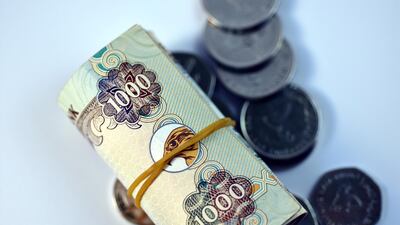The National Committee for Combating Money Laundering and Financing of Terrorism and Illegal Organisations held its second meeting in 2021 to review the progress on strengthening the UAE's technology and legislative frameworks to improve regulatory oversight.
Abdulhamid Saeed Alahmadi, Governor of the UAE Central Bank and chairman of the committee, discussed the latest developments in countering money laundering and combating terrorism financing in the UAE, a statement from the UAE Central Bank said on Saturday.
The meeting, held on Thursday, was also attended by Ahmed Al Sayegh, minister of state and chairman of Abu Dhabi Global Market.
“As the UAE is a global financial centre, we are committed to undertake all necessary actions and implement them to strengthen the anti-money laundering and countering financing of terrorism framework,” Mr Alahmadi said.
“We will continue to fight against money laundering and financing of terrorism with a strong technology framework and processes, address AML/CFT issues and provide effective solutions to mitigate related risks that can face our national economy.”
The UAE, which has strict laws to deal with money laundering and the financing of terrorism, has issued various regulations and adopted numerous measures to fight financial crimes.
The country launched a new agency to combat money launderers, entities and people suspected of financing terrorists and organised crime last month. The Executive Office of Anti-Money Laundering and Counter Terrorism Financing will be affiliated with the Ministry of Foreign Affairs and International Co-operation.
In November, the Ministry of Economy set up an anti-money laundering department to ensure all non-financial businesses and professionals comply with local laws. In addition, a court was established in Abu Dhabi to tackle money laundering and tax evasion cases.
The Central Bank of the UAE also instructed all hawala providers – informal funds transfer service providers for individuals utilising non-bank methods – to register with the central bank to strengthen the oversight of money transfers.
During the meeting, the committee noted the progress made by federal entities in implementing actions under the UAE National Action Plan for anti-money laundering and countering financing of terrorism and decided on further actions.
The committee approved measures that designated businesses and identified non-financial professions must apply while dealing with high-risk countries, the statement said.
These measures will be published on the committee’s website and those of other regulatory bodies to raise awareness and initiate action by licensed entities.
The panel also endorsed the first edition of the National Manual on Financial Intelligence, Financial Investigation and Money Laundering Investigation and decided the terms of its review on a periodic basis.
The manual aims to achieve the goals of the national strategy on AML/CFT and increase the country’s effectiveness in combating money laundering and financing of terrorism by adopting a unified approach.


